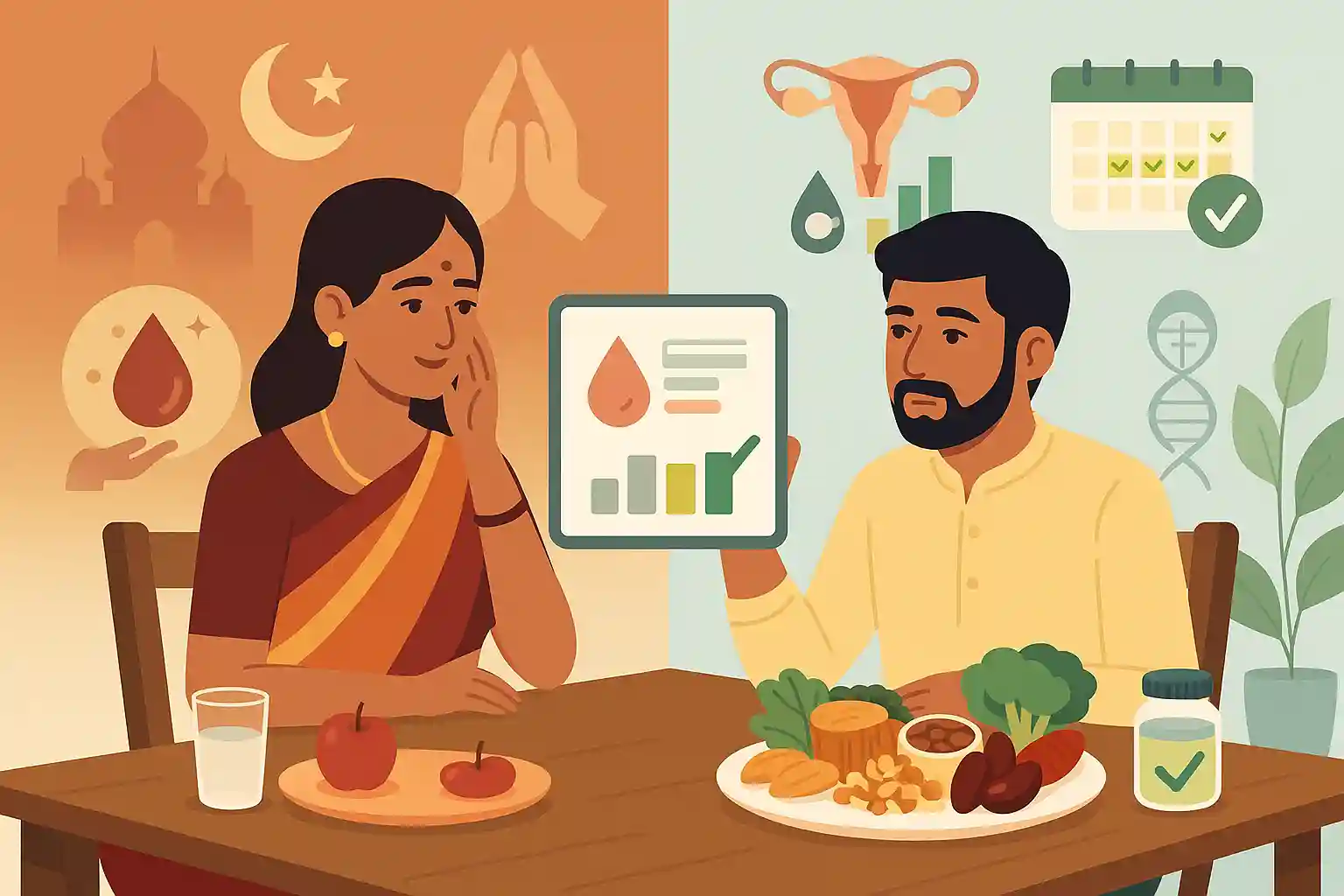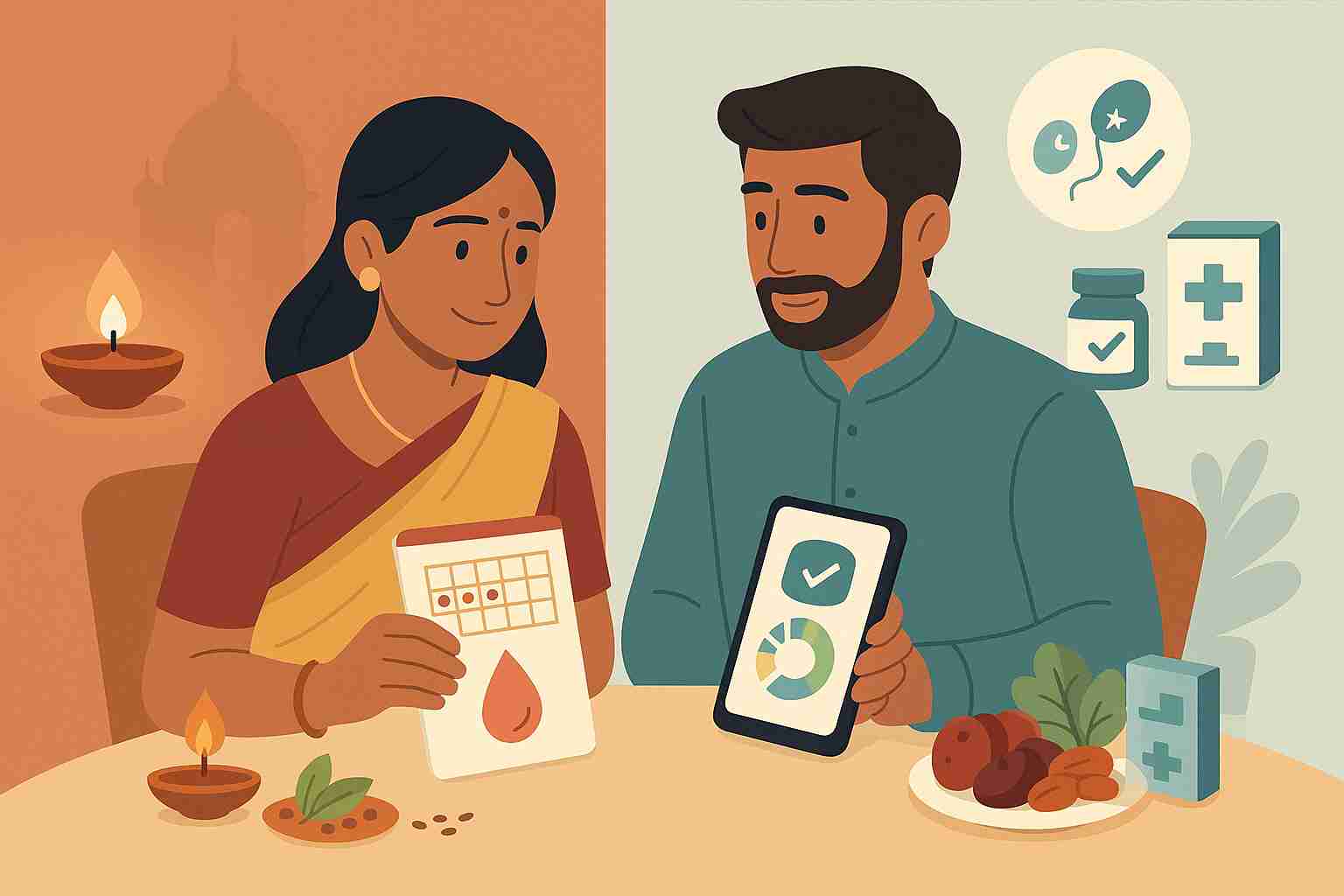"Will my Karva Chauth fast affect my chances of getting pregnant?" This question reflects the dilemma faced by millions of Indian women who want to honor their religious traditions while trying to conceive. With over 40 major fasting days in the Hindu calendar and similar practices in other Indian religions, understanding how these spiritual observances impact fertility is crucial for couples planning families.
The good news? Most religious fasting, when done mindfully, doesn't harm fertility. However, certain practices need modification when you're trying to conceive. Here's how to balance devotion with reproductive health.
Common Indian Fasting Practices
Popular Fasting Observances:
- Karva Chauth: 24-hour fast without water
- Navratri: 9-day partial or complete fasting
- Ekadashi: Monthly 24-hour fasting
- Janmashtami: Complete day fasting
- Maha Shivratri: Night-long fasting
- Ramadan: Dawn-to-sunset fasting for 30 days (Islamic)
- Paryushan: Jain fasting periods
Types of Fasting:
- Nirjala: Complete fasting without water
- Phalahar: Fruit and milk only
- Ekadashi: Avoiding grains and beans
- Intermittent fasting during festival periods
How Fasting Affects Female Fertility
Hormonal Impact:
- Sudden calorie restriction can disrupt menstrual cycles
- Extreme fasting may delay ovulation
- Dehydration affects cervical mucus quality
- Stress hormones increase during prolonged fasting
- Blood sugar fluctuations impact reproductive hormones
When Fasting May Help:
- Mild intermittent fasting can improve insulin sensitivity
- May help women with PCOS regulate cycles
- Can reduce inflammation in the body
- Supports healthy weight management
Impact on Male Fertility
Effects on Sperm Quality:
- Severe calorie restriction reduces testosterone levels
- Dehydration affects sperm concentration
- Nutritional deficiencies impact sperm production
- Short-term fasting (1-2 days) usually doesn't harm sperm
- Extended fasting periods may reduce sperm count
Safe Fasting Guidelines When Trying to Conceive
For Women:
- Avoid nirjala (waterless) fasting during ovulation window
- Stay hydrated during all other fasting periods
- Break fasts if you feel dizzy or extremely weak
- Consider modified fasting (fruits/milk) instead of complete fasting
- Maintain folic acid supplementation during fasting periods
For Men:
- Limit complete fasting to 1-2 days per month
- Stay well-hydrated during fasting periods
- Ensure adequate nutrition during non-fasting days
- Consider zinc and antioxidant supplements
- Avoid fasting if already underweight
Timing Fasting with Your Fertility Window
Best Times to Fast:
- During menstrual period (days 1-5)
- Early follicular phase (days 6-10)
- Luteal phase if pregnancy test is negative
Avoid Intense Fasting During:
- Ovulation window (days 12-16 of cycle)
- Two-week wait after ovulation
- If pregnancy is suspected
- During fertility treatments like IUI or IVF
- If you have irregular menstrual cycles
Fertility-Friendly Fasting Modifications
Karva Chauth Adaptations:
- Sip water if feeling dizzy (prioritize health)
- Break fast early if unwell
- Consume nutrient-dense pre-dawn meal
- Include dates and nuts for sustained energy
Navratri Modifications:
- Choose phalahar (fruit diet) over complete fasting
- Include dairy, nuts, and fruits regularly
- Maintain meal timing even with restricted foods
- Stay hydrated throughout the day
Ramadan Considerations:
- Focus on nutrient-dense suhoor and iftar meals
- Include protein, healthy fats, and complex carbs
- Consider exemption if pregnancy is suspected
- Consult religious scholars about health exemptions
Nutritional Strategy During Fasting Periods
Pre-Fasting Meal (Suhoor/Early Morning):
- Include complex carbohydrates: Oats, whole wheat
- Add protein: Eggs, paneer, nuts
- Healthy fats: Ghee, almonds, seeds
- Hydrating foods: Milk, coconut water, fruits
- Avoid caffeine which increases dehydration
Breaking the Fast:
- Start with dates and water
- Light soup or coconut water for rehydration
- Avoid heavy, fried foods immediately
- Include fertility-supporting foods: Pomegranate, figs, milk
When to Avoid Fasting Completely
Medical Reasons:
- PCOS with irregular periods
- Diabetes or hypoglycemia
- Eating disorders or very low BMI
- Previous pregnancy complications
- Undergoing fertility treatments
- History of miscarriages
Fertility Treatment Cycles:
- During IVF stimulation phase
- Around IUI procedures
- While taking fertility medications
- During diagnostic tests like HSG
Religious and Cultural Considerations
Balancing Faith and Health:
- Most religions permit health exemptions from fasting
- Pregnancy and conception attempts are valid reasons for modification
- Consult religious authorities about health-based adaptations
- Focus on spiritual aspects beyond just food restrictions
- Consider alternative forms of devotion during this period
Family and Social Pressure:
- Educate family about fertility and fasting concerns
- Seek support from elders who understand health priorities
- Remember that health is also a religious duty
- Consider private modifications if social pressure is high
Scientific Evidence on Fasting and Fertility
Research Findings:
- Occasional short-term fasting doesn't significantly impact fertility
- Chronic calorie restriction can suppress reproductive hormones
- Intermittent fasting may improve fertility in overweight women
- Extreme fasting can delay ovulation by 1-2 days
- Adequate nutrition is more important than fasting frequency
Practical Action Plan
Before Fasting:
- Track your menstrual cycle to identify safe fasting days
- Consult doctor if you have fertility concerns
- Plan nutrient-dense pre and post-fasting meals
- Discuss modifications with family and religious advisors
During Fasting:
- Listen to your body - break fast if feeling unwell
- Stay hydrated when permitted
- Avoid strenuous physical activity
- Rest adequately during fasting periods
After Fasting:
- Resume normal, balanced nutrition immediately
- Focus on fertility-supporting nutrients
- Monitor menstrual cycle for any irregularities
- Continue prenatal vitamins and supplements
The Bottom Line
Religious fasting and fertility can coexist harmoniously with mindful planning. The key is moderation, timing, and prioritizing your health while respecting your faith. Most occasional fasting doesn't significantly impact conception chances, but extreme or poorly timed fasting might.
Remember, bringing a healthy child into the world is also a sacred responsibility. Your religious traditions likely emphasize health and well-being—use this as guidance when making fasting decisions during your conception journey.
If you're trying to conceive, consider modified fasting approaches, time your fasts wisely, and never hesitate to prioritize your reproductive health. Conception is a blessing that requires a healthy body as its foundation.



